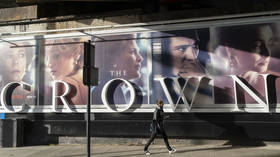Liberal critics are blatantly biased against ‘Hillbilly Elegy’… but it is a truly TERRIBLE movie

Netflix’s new film ‘Hillbilly Elegy’ chronicles life in a dysfunctional white working-class family. Savage reviews from liberal critics have triggered another culture war battle, but, putting politics aside, the movie is dismal.
‘Hillbilly Elegy’, the new film from Oscar-winning director Ron Howard, premiered to much fanfare and controversy on Netflix on Tuesday.
The film, which stars perennial Oscar nominees Amy Adams and Glenn Close, is based on JD Vance’s 2016 autobiography of the same name, and tells the story of how Vance escaped his chaotic upbringing at the hands of his white working-class Appalachian family, most notably his volcanically erratic mother Bev and his hard-edged grandmother Mamaw, and became a Yale Law School graduate.
The book ‘Hillbilly Elegy’ became a cause celebre in the wake of Trump’s 2016 election victory because it gave the establishment a glimpse into the misunderstood white working-class and poor folk from flyover country that had come out en masse for Trump.
Among the media elite, the shine wore off Vance and his book pretty quickly, though, as he was labeled too conservative for consumption after having the temerity to label his hometown hillbilly culture as corrosive and self-destructive. Vance’s critique of the Appalachian white working class was just too pro-personal responsibility for the liberal establishment’s tastes.
It is in this context that ‘Hillbilly Elegy’ has come out in film form and generated a great deal of vitriol and venom from mainstream movie critics.
For example, Ty Burr of the Boston Globe proclaimed it “poverty porn.” Michael O’Sullivan of the Washington Post called it “almost laughably bad – if it weren’t so melodramatic.” And Justin Chang of the Los Angeles Times derisively decried the movie as “an unwieldy slop bucket of door-smashing, child-slapping, husband-immolating histrionics.”
These critical eviscerations are not anomalies as the film currently has a dismal 25 percent critical score on review aggregator site Rotten Tomatoes. There is some pushback though, as the film currently boasts a robust 89 percent audience score on the same site.
In response to the cavalcade of critical denouncements, noted conservative pundit Ben Shapiro tweeted about the film: “I’ve seen ‘Hillbilly Elegy.’ Amy Adams and Glenn Close are both terrific. The movie is a well-told family drama. The reason the critics are crapping all over it is simple: the book was treated as humanizing ‘Trump supporters,’ and is now a Bad Book™. So the movie is also Bad™.”
My experience of ‘Hillbilly Elegy’ began when I read the book back in 2016. I thoroughly enjoyed it and found it to be an extremely insightful and compelling account. ‘Hillbilly Elegy’ is an important book and it should have been an important movie, but having seen it I can report that it most assuredly is not. Instead, it is a maudlin, dramatically obtuse, narratively incoherent, appallingly poorly made and atrociously amateurish cinematic venture.
Director Ron Howard is an artistic eunuch not exactly known for his deft cinematic touch, and he is as ham-fisted as ever on ‘Hillbilly Elegy’. Howard clumsily creates a contrived drama and fumbles the film’s flimsy narrative to such an egregious degree as to be cinematically criminal.
Howard’s visually unimaginative, painfully trite and obscenely shallow approach reduces Vance’s dramatically potent life story into a cinematically flaccid cross between a Lifetime movie, an ABC Afterschool Special, and an anti-drug public service announcement.
As for the acting? Amy Adams is one of the best actresses around, but her performance as the volcanic and volatile Bev is forced and rings entirely false. Decked out in her oversized ‘mom jeans’, with frizzy hair and sans make-up, Adams is devoid of both subtlety and humanity. Adams’ performance is such an over-the-top, one-note caricature it is actually embarrassing.
Glenn Close’s contrived performance as the foul-mouthed matriarch Mamaw doesn’t fare much better. Both Close and Adams are obviously angling for an Oscar with their uglified, faux-gritty acting, but they end up being uncomfortably shallow and cartoonish in their roles.
Ben Shapiro claiming that ‘Hillbilly Elegy’ is “well-told” and that Adams and Close are “terrific” only proves that he is either being intentionally contrarian in order to stoke the culture war or he really doesn’t know a goddamn thing about movies and acting. I promise you, ‘Hillbilly Elegy’ is not the hill(billy) that Ben Shapiro should be willing to die on.
Also on rt.com Our deadly Frankenstein: Social media’s creators admit it dehumanizes people, disrupts social fabric and destroys democracyWith that said, I have no doubt that liberal critics are gleefully overplaying the very bad hand that is ‘Hillbilly Elegy’. If the film were made by a minority director as opposed to a pasty white one, and dealt with black poverty as opposed to poor white people, their criticisms of it would be substantially more delicate and thoughtful.
White liberal critics have long been protective and paternalistic toward black artists and films. Examples of which can be found in the critical reception of Spike Lee’s film ‘Da Five Bloods’ (2020) and Ava DuVernay’s ‘A Wrinkle in Time’ (2018). Both movies are dreadful cinematic disasters, but critics fawned over ‘Da Five Bloods’ and were wholly encouraging of DuVernay’s abysmal film because of its “diversity.”
‘Hillbilly Elegy’ could have been treated with the same kid gloves and rose-colored glasses as Lee and DuVernay’s work, but wasn’t, and one can surmise that the white working-class subject matter and the conservative politics of the protagonist are a major reason why.
So is ‘Hillbilly Elegy’ truly that terrible or, as Ben Shapiro suggests, are liberal movie critics blatantly biased against it?
The answer is definitely YES… to both.
Think your friends would be interested? Share this story!
The statements, views and opinions expressed in this column are solely those of the author and do not necessarily represent those of RT.















